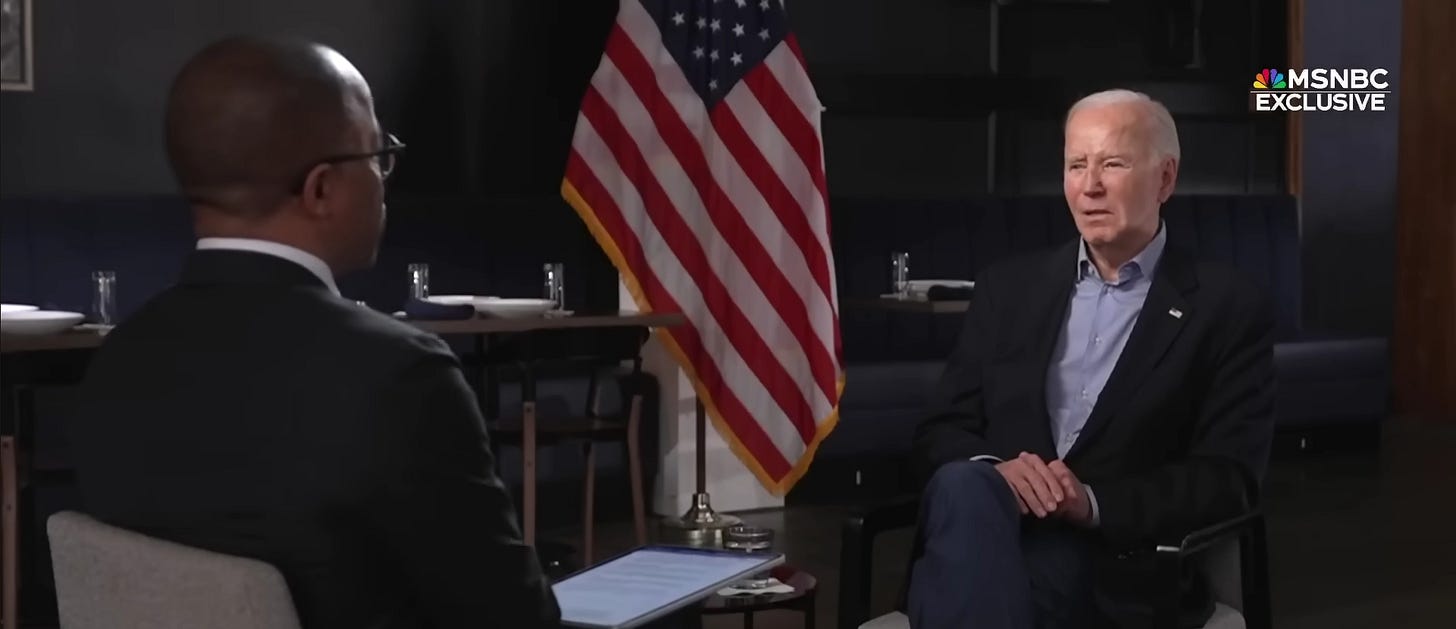Jonathan Capehart recently snagged an interview with President Biden, which aired on MSNBC over the weekend. At one point, Capehart asked Biden specifically about the Uncommitted movement taking shape in the Democratic primaries, as a method of communicating voter displeasure with the trajectory of hostilities in the Middle East and the role of the United States in said hostilities. (This is at ~ 7:53 of the recorded remarks.)
Capehart noted that the message was one of Biden’s complicity in Israel’s genocide — acknowledging that ‘genocide’ was a harsh term — and that voters are saying such complicity imperils their ability to cast a vote for Biden in the fall.
Biden, for his part, seemed to take offense that the term could be something applied to him; and then he disputed that that was the message being sent by the bulk of the Uncommitted vote at all. When Capehart asked what his response was to that widely shared sentiment among Uncommitted voters, Biden brusquely replied, “It’s not widely shared.”
“It’s not widely shared. You guys make judgments you know you’re not capable of making. That’s not what all those people said. What they said was they’re very upset, and I don’t blame them for being upset. Their family’s there. Their people are dying. They want something done about it, and they’re saying, ‘Joe, do something, do something.’ But the idea that they all think it’s genocide, it’s just not—that’s a different situation.”
Biden pivoted to pigeonholing such voters, casting them all as having relatives in the region.
“Look, I can fully understand, and can’t you? You have a family member there, a family member, a family that comes from there, or a family that is still isolated there and may be victimized. It’s understandable, and that’s why I’m doing everything I can to try to stop it.”
Basically, he reduced the import of the Uncommitted vote by saying in effect, “It’s all these Palestinian Americans, Arab Americans, Muslim Americans — they’re driven by personal grief or anger. They’re sentimental! And so that motive for voting can be disregarded.”
This belies reality, as many demographics participated in the Uncommitted movement here in Michigan, including many voters who are in other minority populations as well as young (i.e., idealistic) voters. For example, Ann Arbor, the home of the University of Michigan, saw 19% of its vote returned for Uncommitted. That’s a flashing indicator. (As has been widely reported, “uncommitted” in Michigan obtained about 13% of the vote total.)
The movement has spread outside of Michigan. Branko Marcetic of Jacobin provided a breakdown of some of the states in question. We saw Uncommitted garner approximately 20% in Minnesota, and I guarantee you that a miniscule percentage of that number came from Arab-American and Muslim-American communities in that setting.
Indeed, I have not crunched the numbers, but I did retrieve a few. As Marcetic noted, the majority of Uncommitted’s haul in Minnesota came from five areas: Hennepin, Ramsey, Rice, Olmsted, and St. Louis counties, at 26%, 24%, 22%, 16%, and 15%, respectively. In contrast, according to statewide data, the city (not county) in Minnesota with the highest percentage of Arab ancestry is Dilworth, MN, population 4104, with 6.2%. Statewide, 0.46% of Minnesota’s population has Arab ancestry.
In North Carolina, another state Marcetic examined, seven counties provided nearly half of the state’s “no preference” vote, the equivalent of ‘uncommitted’ in Michigan and Minnesota. Those counties were Wake, Mecklenburg, Guilford, Forsyth, Cumberland, Durham, and Buncombe, with 13%, 10%, 10%, 11%, 9%, 14%, and 15%, respectively (rounded figures). Overall, 12.7% of the Democratic primary votes went to “no preference.” According to statewide data, the city (not county) in North Carolina with the highest percentage of Arab ancestry is Autryville, NC, population 405, with 9.2%. Statewide, 0.40% of North Carolinians claim Arab ancestry.
The third state Marcetic detailed was Massachusetts, where he noted the returns of five cities: Somerville, Cambridge, Northampton, Medford, and Boston, which provided 23%, 17%, 16%, 15%, and 14% of the “uncommitted” vote, respectively. In contrast, Cheshire, MA, the city with the highest reported Arab ancestry in Massachusetts (population 571), has about 10% in that category, with the state as a whole reflecting 1% of its total with said background.
Now, I haven’t compared apples to apples (the primary results are by county; the statewide data, taken from is by city; also, data by religious preference is not available). But it’s clear that the phenomenon of the Uncommitted movement cannot possibly be reduced to only those who have relatives in the region.
What really caught my attention is the fact that Biden takes the idea or notion that he’s suborning genocide (or at least supporting it) personally. He takes it as an insult, clearly discerned from his ruffled-feathers stance when Capehart asked him the question. This indignance is blinding him, limiting his ability to accurately interpret a very clear meaning that was communicated through the (admittedly clunky) medium of vote-casting. He is motivated to misinterpret those results. This can only bode poorly for Joe Biden.





Biden sends more arms bypassing Congress while saying he's disturbed that Nethu is ignoring his pleas. It makes no sense.